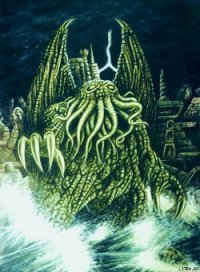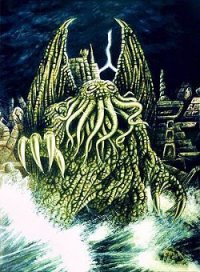Зов Ктулху / The Call of Chulhu - Лавкрафт Говард (мир бесплатных книг .TXT) 📗
Then, whispered Castro, those first men formed the cult around tall idols which the Great Ones showed them; idols brought in dim eras from dark stars. That cult would never die till the stars came right again, and the secret priests would take great Cthulhu from His tomb to revive His servants and resume His rule of earth. This time would be easy to know, for then mankind would become as the Great Old Ones; free and wild and beyond good and evil, with laws and morals thrown aside. And all men would be shouting and killing and revelling in joy. Then the liberated Old Ones would teach them new ways to shout and kill and revel and enjoy themselves, and all the earth would flame with a holocaust of ecstasy and freedom. Meanwhile the cult, by appropriate rites, must keep alive the memory of those ancient ways and tell about their return.
In the elder time chosen men had talked with the entombed Old Ones in dreams, but then something happened. The great stone city R’lyeh, with its monoliths and sepulchres, had sunk beneath the waves; and the deep waters, full of the one primal mystery through which not even thought can pass, had cut off the communication. But memory never died, and the high-priests said that the city would rise again when the stars were right. Then the black spirits of earth would come out, mouldy and shadowy, and full of dim rumours. But old Castro dared not speak much of them. He became silent hurriedly, and said nothing more. He curiously declined to mention the size of the Old Ones, too. Of the cult, he said that he thought the centre lay amid the pathless desert of Arabia, where Irem, the City of Pillars, [66] dreams hidden and untouched. It was not connected to the European witch-cult, and was virtually unknown beyond its members. No book had ever mentioned it, though the deathless Chinamen said that there were double meanings in the Necronomicon of the mad arab Abdul Alhazred [67] which the initiated might read, especially the this couplet:
Legrasse, deeply impressed, had inquired about the historic affiliations of the cult. Castro, apparently, had told the truth when he said that it was wholly secret. The authorities at Tulane University [69] could say nothing about either cult or image, and now the detective had come to the highest authorities in the country and met with the Greenland tale of Professor Webb.
The great interest aroused at the meeting by Legrasse’s tale is echoed in the correspondence of those who attended; although it was not mentioned in the formal publications of the society. Caution is the first care of scientists who often face charlatanry and imposture. Legrasse lent the image to Professor Webb. When Professor had died, it was returned to him. I viewed it not long ago. It is truly a terrible thing, and akin to the dream-sculpture of young Wilcox.
I did not wonder that my uncle was excited by the tale of the sculptor. Professor Angell started an investigation immediately; though privately I suspected young Wilcox of trickery. He could invent a series of dreams to heighten and continue the mystery. So, after thoroughly studying the manuscript again and correlating the theosophical and anthropological notes with the cult narrative of Legrasse, I made a trip to Providence to see the sculptor and accuse him of imposing upon a learned and aged man.
Wilcox still lived alone in the Fleur-de-Lys Building in Thomas Street, a hideous Victorian imitation of 17th century Breton Architecture. [70] I found him at work in his rooms, and understood at once that his genius is indeed profound and authentic. I believe one day he will be well-known as one of the great decadents; for he has crystallised in clay and in marble those nightmares and phantasies which Arthur Machen [71] evokes in prose, and Clark Ashton Smith [72] makes visible in verse and in painting.
Dark, frail, he asked me about my business without rising. Then I told him who I was, he displayed some interest; for my uncle had excited his curiosity studying his strange dreams, yet had never explained the reason for the study. In a short time I became convinced of his absolute sincerity, for he spoke of the dreams in a manner none could mistake. They had influenced his art profoundly, and he showed me a morbid statue whose contours almost made me shake. He could not recall the original of this thing except in his own dream bas-relief, but the outlines had formed themselves insensibly under his hands. It was, no doubt, the giant shape he had seen in delirium. But he really knew nothing of the hidden cult.
He talked of his dreams in a strangely poetic fashion; making me see the damp Cyclopean city of slimy green stone – whose geometry, he said, was all wrong – and hear with frightened expectancy the ceaseless, half-mental calling from underground: “Cthulhu fhtagn”, “Cthulhu fhtagn.”
These words had formed part of that dread ritual which told of dead Cthulhu’s dream-vigil in his stone vault at R’lyeh, and I felt deeply touched despite my rational beliefs. Wilcox, I was sure, had heard of the cult in some casual way, and had soon forgotten it amidst the mass of his equally weird reading and imagining. Later it had found subconscious expression in dreams, in the bas-relief, and in the terrible statue. The young man was slightly affected and slightly ill-mannered, that type I never liked, but I admit both his genius and his honesty. I wish him all the success his talent promises.
The matter of the cult still fascinated me, and sometimes I met serious researches. I visited New Orleans, talked with Legrasse and other people of that old-time party, saw the frightful image, and even questioned some mongrel prisoners. Old Castro, unfortunately, had been dead for some years. What I now heard was really no more than a detailed confirmation of what my uncle had written, and it excited me. I felt sure that I touched a very real, very secret, and very ancient religion whose discovery would make me a famous scientist. My attitude was absolute materialistic.
One thing I began to suspect, and which I now fear I know, is that my uncle’s death was not natural. He fell on a narrow hill street leading up from an ancient waterfront, after a careless push from a negro sailor. I did not forget the mixed blood and marine background of the cult-members in Louisiana, and I would not be surprised to learn of secret methods and rites and beliefs. Legrasse and his men, it is true, have been alive; but in Norway a certain seaman who saw everything is dead. Maybe the deeper inquiries of my uncle have come to sinister ears? I think Professor Angell died because he knew too much, or because he could learn too much. And at the moment I have learned much, too.
III. The Madness from the Sea
I had almost ceased my inquiries into what Professor Angell called the “Cthulhu Cult”, and was visiting a learned friend in Paterson, New Jersey; the curator of a local museum and a famous mineralogist. Examining one day the stones in a rear room of the museum, my eye noticed an odd picture in one of the old papers spread beneath the stones. It was the Australian journal, the Sydney Bulletin, [73] for April 18, 1925. There was a picture of a hideous stone image almost identical with that which Legrasse had found in the swamp.


